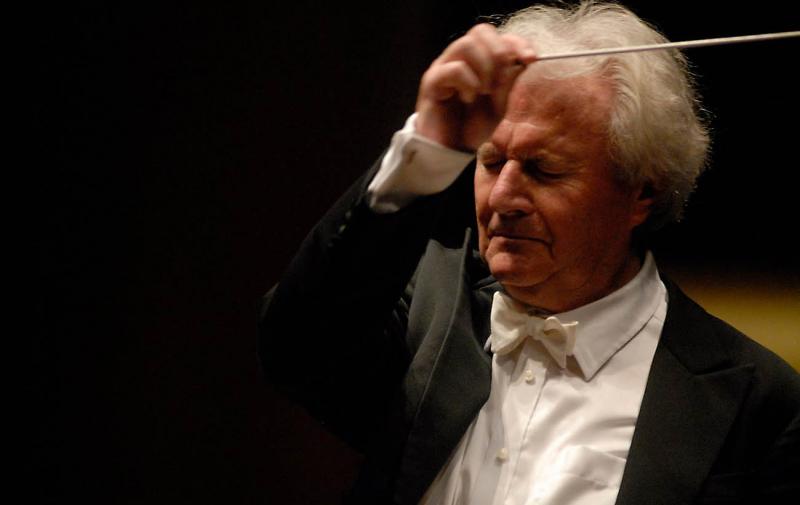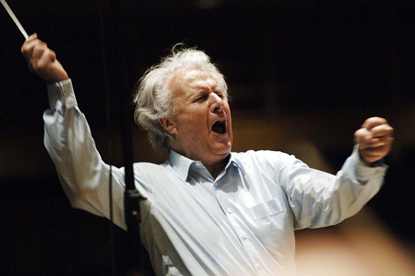Sir Colin Davis, 1927-2013 | reviews, news & interviews
Sir Colin Davis, 1927-2013
Sir Colin Davis, 1927-2013
All-time great British conductor who enjoyed an indian summer with the LSO

In its ebbs, flows and final grand flourishing, the career of Sir Colin Davis was reminiscent of some of the great musical masterpieces with which he became closely identified. From Mozart to Tippett, Berlioz to Beethoven and Sibelius, Davis proved himself one of the major international conductors of the post-war era.
Born in Weybridge in Surrey's stockbroker belt in 1927, the fifth of seven children, he was educated at Christ's Hospital thanks to the largesse of a wealthy great-uncle. He took up the clarinet and won a scholarship to the Royal College of Music, where he studied with Frederick Thurston, but his ambition to become a conductor was thwarted by his inability to play the piano, which rendered him ineligible for the RCM's conducting class. His plans were frustrated further by being called up for National Service, during which he served as a clarinettist in the band of the Household Cavalry.
In 1977 he became the first British conductor to appear at Bayreuth
Emerging from the military in 1949, he married his first wife, the soprano April Cantelo, and formed the Kalmar Orchestra with other RCM graduates, which he frequently conducted. This evolved into the semi-professional Chelsea Opera Group, with whom Davis began to win recognition for his conducting of Mozart's operas, not least Don Giovanni.
Following a period of eking out a living by teaching and taking part-time jobs as a clarinettist, he became assistant conductor of the BBC Symphony Orchestra in 1957. In 1959 he basked in plaudits after substituting for an ailing Otto Klemperer in a performance of Don Giovanni at the Royal Festival Hall, and the following year he brilliantly stepped in to conduct Mozart's Die Zauberflöte at Glyndebourne when Thomas Beecham fell ill.
In 1961 he was appointed music director at Sadler's Wells Opera, where he delivered notable performances of works by Stravinsky and Beethoven's Fidelio, but during this period he became notorious for his abrasive manner towards his workmates. He resigned in 1964, a move influenced by the traumatic breakdown of his marriage. However, that same year he married Iranian student Ashraf Naini ("Shamsi") - they were married in Iran and the UK to satisfy the bureaucratic requirements of both countries - and the couple's relationship seemed to bring Davis a new and transformative lease of life.
In 1967 he became chief conductor of the BBC Symphony Orchestra, where he was given free rein to pursue new music by the BBC's controller of music William Glock, and championed, among others, Michael Tippett and Peter Maxwell Davies. In 1971 he was chosen to succeed Georg Solti as music director of the Royal Opera House. His 15-year tenure would bring triumphant performances of Berlioz's Les Troyens and Tippett's The Knot Garden and The Ice Break, but Davis also took some critical flak for a number of productions, including Verdi's Nabucco in 1972 and the 1974-76 staging of Wagner's Ring Cycle.
But by now Davis was enjoying a burgeoning international reputation, becoming the first British conductor to appear at Bayreuth when he conducted Tannhäuser there in 1977, then enjoying a rewarding stay with the Bavarian Radio Symphony Orchestra from 1983. In 1990 he was made principal guest conductor with the Dresden Staatskapelle.
 The indian summer of Davis's career truly began with his appointment as chief conductor of the London Symphony Orchestra in 1995, which ushered in the era of the mature, majestic Sir Colin (he'd been knighted in 1980). Mozart, Brahms, Dvorak, Elgar and Beethoven all glowed under his baton, along with Tippett and James MacMillan, while he became especially renowned for his unmatched interpretations of Berlioz and Sibelius. Many splendid performances are preserved on the LSO Live label, including the Berlioz Requiem from June 2012 which was the last work Davis conducted with the orchestra. In 2006 he won a Best Opera Grammy Award for the LSO Live recording of Verdi's Falstaff.
The indian summer of Davis's career truly began with his appointment as chief conductor of the London Symphony Orchestra in 1995, which ushered in the era of the mature, majestic Sir Colin (he'd been knighted in 1980). Mozart, Brahms, Dvorak, Elgar and Beethoven all glowed under his baton, along with Tippett and James MacMillan, while he became especially renowned for his unmatched interpretations of Berlioz and Sibelius. Many splendid performances are preserved on the LSO Live label, including the Berlioz Requiem from June 2012 which was the last work Davis conducted with the orchestra. In 2006 he won a Best Opera Grammy Award for the LSO Live recording of Verdi's Falstaff.
Something of the spirit of Davis will doubtless live on in the many students he taught during his 25 years as international chair of orchestral studies at the Royal Academy of Music and his equivalent post at Dresden's Music Conservatory. As well as numerous international awards, he was made a CBE in 1965, and won a Royal Philharmonic Society Gold Medal in 1995. Lady Davis died in June 2010, but the couple are survived by their five children. A major artsdesk tribute to Sir Colin is in preparation.
- Colin Rex Davis, 25 September 1927 - 14 April 2013.
Subscribe to theartsdesk.com
Thank you for continuing to read our work on theartsdesk.com. For unlimited access to every article in its entirety, including our archive of more than 15,000 pieces, we're asking for £5 per month or £40 per year. We feel it's a very good deal, and hope you do too.
To take a subscription now simply click here.
And if you're looking for that extra gift for a friend or family member, why not treat them to a theartsdesk.com gift subscription?
more Classical music
 Britten Sinfonia, The Marian Consort, Milton Court review - a journey around turbulent spirit Gesualdo
Contemporary homages among the works in this celebration of the Renaissance 'badass'
Britten Sinfonia, The Marian Consort, Milton Court review - a journey around turbulent spirit Gesualdo
Contemporary homages among the works in this celebration of the Renaissance 'badass'
 Classical CDs: Coffee, peppercorns and puppets
A prolific conductor's centenary celebrated, plus Hungarian ballet music and baroque keyboard concertos
Classical CDs: Coffee, peppercorns and puppets
A prolific conductor's centenary celebrated, plus Hungarian ballet music and baroque keyboard concertos
 Sansara, Manchester Collective, Bridgewater Hall, Manchester review - sense of a unique experience
Three world premieres all respond to Feldman’s 'Rothko Chapel'
Sansara, Manchester Collective, Bridgewater Hall, Manchester review - sense of a unique experience
Three world premieres all respond to Feldman’s 'Rothko Chapel'
 Gomyo, National Symphony Orchestra, Kuokman, National Concert Hall, Dublin review - painful brilliance around a heart of darkness
A violinist for all facets of a towering Shostakovich masterpiece
Gomyo, National Symphony Orchestra, Kuokman, National Concert Hall, Dublin review - painful brilliance around a heart of darkness
A violinist for all facets of a towering Shostakovich masterpiece
 Remembering conductor Andrew Davis (1944-2024)
Fellow conductors, singers, instrumentalists and administrators recall a true Mensch
Remembering conductor Andrew Davis (1944-2024)
Fellow conductors, singers, instrumentalists and administrators recall a true Mensch
 Hallé, Wong, Bridgewater Hall, Manchester review - meeting a musical communicator
Drama and emotional power from a new principal conductor
Hallé, Wong, Bridgewater Hall, Manchester review - meeting a musical communicator
Drama and emotional power from a new principal conductor
 Guildhall School Gold Medal 2024, Barbican review - quirky-wonderful programme ending in an award
Ginastera spolights the harp, Nino Rota the double bass in dazzling performances
Guildhall School Gold Medal 2024, Barbican review - quirky-wonderful programme ending in an award
Ginastera spolights the harp, Nino Rota the double bass in dazzling performances
 Queyras, Philharmonia, Suzuki, RFH review - Romantic journeys
Japan's Bach maestro flourishes in fresh fields
Queyras, Philharmonia, Suzuki, RFH review - Romantic journeys
Japan's Bach maestro flourishes in fresh fields
 Classical CDs: Swans, hamlets and bossa nova
A promising young pianist's debut disc, plus Finnish mythology and a trio of neglected British composers
Classical CDs: Swans, hamlets and bossa nova
A promising young pianist's debut disc, plus Finnish mythology and a trio of neglected British composers
 Christian Pierre La Marca, Yaman Okur, St Martin-in-The-Fields review - engagingly subversive pairing falls short
A collaboration between a cellist and a breakdancer doesn't achieve lift off
Christian Pierre La Marca, Yaman Okur, St Martin-in-The-Fields review - engagingly subversive pairing falls short
A collaboration between a cellist and a breakdancer doesn't achieve lift off
 Ridout, Włoszczowska, Crawford, Lai, Posner, Wigmore Hall review - electrifying teamwork
High-voltage Mozart and Schoenberg, blended Brahms, in a fascinating programme
Ridout, Włoszczowska, Crawford, Lai, Posner, Wigmore Hall review - electrifying teamwork
High-voltage Mozart and Schoenberg, blended Brahms, in a fascinating programme
 Sabine Devieilhe, Mathieu Pordoy, Wigmore Hall review - enchantment in Mozart and Strauss
Leading French soprano shines beyond diva excess
Sabine Devieilhe, Mathieu Pordoy, Wigmore Hall review - enchantment in Mozart and Strauss
Leading French soprano shines beyond diva excess

Add comment